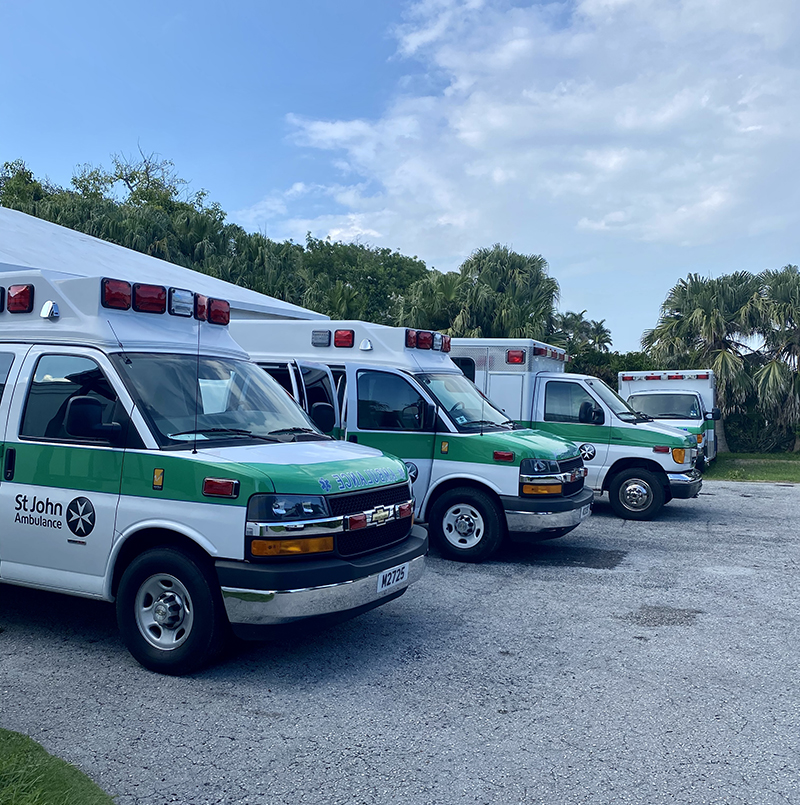St John’s ‘Tips To Help Keep Safe In The Sun’
As the Cup Match holiday weekend approaches, St John Ambulance has provided “a few simple, but life saving tips to help keep safe in the sun.”
A spokesperson said, “With temperatures forecasted to rise above 80 degrees this week, St John Ambulance Bermuda is sharing a few simple, but life saving tips to help keep safe in the sun over the Cup Match holiday.
“Recognising the signs and knowing how to treat heat-related illnesses such as heat exhaustion and heatstroke can be crucial to help persons take care of themselves and others, as well as avoiding trips to the hospital during one of the island’s most celebrated holidays.
“Heat-related conditions occur when the body is unable to compensate and properly cool itself. The body normally cools itself by sweating but when the humidity is high, sweat will not evaporate as quickly which prevents the body from releasing heat [quickly]. Young children and the elderly are particularly susceptible to high temperatures. Other risk factors include dehydration, obesity, heart disease, prescription drug use and alcohol use.
“The two most serious problems that can occur with extreme heat are heat exhaustion and heatstroke but knowing the signs and symptoms and what steps to take could be the difference between a life saved and a life lost in an emergency situation.
“St John Ambulance volunteers will be out helping to keep our community safe over the Cup Match holiday. We encourage everyone to check in on their elderly relatives and neighbours and to look after themselves by staying out of the sun or covering up, wearing sunblock and drinking plenty of water throughout the day.
Dehydration
“Dehydration happens when someone loses more fluid than they take in, so it’s important to stay hydrated throughout the day. Signs of dehydration include headaches, feeling lightheaded, dry mouth, eyes and lips, muscle cramps and passing small amounts of dark coloured urine.
“To treat dehydration:
- 1. “Drink plenty of water or [non-alcoholic] fluids with electrolytes – don’t wait until you’re thirsty. Keep hydrating throughout the day.
- 2. “Rest and cool down – get out of the heat if possible and cool down. If they have any muscle cramps, rest and stretch.
- 3. “Stay alert and know the signs – if untreated, someone with dehydration can develop heat exhaustion so it’s important to rehydrate as soon as possible.
Heat Exhaustion
“Heat exhaustion occurs when the body loses salt and water, usually through excessive sweating. Although not as serious as heatstroke, heat exhaustion isn’t something to be taken lightly. Without treatment, it may progress to heatstroke, which can damage the brain and other vital organs and even cause death.
“Signs and symptoms of heat exhaustion include nausea or vomiting, dizziness, profuse sweating, pale and clammy skin [even in extreme heat], feeling faint, loss of appetite, fatigue, a rapid, weak pulse and shallow breathing.
“If you think you or someone is experiencing heat exhaustion:
- 1. “Stop all activity and rest – immediately get out of the heat and cool your body down by moving to a shady area or to an air-conditioned spot.
- 2. “Remove any tight or extra layers of clothing and place ice packs at the neck, armpits and groin.
- 3. “To rehydrate, drink water or a sports drink that contains electrolytes.
- 4. “Call 911 if symptoms worsen or do not improve.
Heatstroke
“Heatstroke is the most serious form of heat injury and can be life threatening. It is considered a medical emergency so if suspected, call 911 immediately. Signs may vary but include the following: throbbing headache, dizziness, nausea, confusion, red, hot and dry skin [lack of sweating], a rapid, strong pulse, and loss of consciousness.
“Heatstroke can cause death or permanent disability if emergency treatment is not provided.
- 1. “Immediately move the person to a cool area out of direct sunlight and remove any unnecessary clothing.
- 2. “Cool the person’s entire body by sponging or spraying cold water and fan the person to help lower their body temperature. Apply ice packs to the neck, armpits and groin.
- 3. “Do not give them anything to drink – most people with heatstroke have an altered level of consciousness and cannot safely be given fluids drink.
- 4. “While waiting for help to arrive, keep checking their temperature as well as their breathing, pulse and level of response.
“For more first aid advice or information on St John Ambulance Bermuda including volunteering opportunities, first aid training and how to make a donation, visit www.sjabermuda.org.”
Read More About
Category: All



